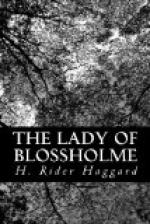So Bridget was hacked free, and together with the wounded men, of whom there were several, dragged and supported thence. Then began a running fight, but one in which they still held their own. Yet they would have been overwhelmed at last, for the women and the wounded hampered them, had not help come. For as they hewed their path towards the belt of trees with the Abbot’s fierce fellows, some of whom were French or Spanish, hanging on their flanks, suddenly, in the gap where the roadway ran, appeared a horse galloping and on it a woman, who clung to its mane with both hands, and after her many armed men.
“Look, Emlyn, look!” exclaimed Cicely. “Who is that?” for she could not believe her eyes.
“Who but Mother Matilda,” answered Emlyn; “and by the saints, she is a strange sight!”
A strange sight she was indeed, for her hood was gone, her hair, that was ever so neat, flew loose, her robe was ruckled up about her knees, the rosary and crucifix she wore streamed on the air behind her and beat against her back, and her garb had burst open at the front; in short, never was holy, aged Prioress seen in such a state before. Down she came on them like a whirlwind, for her frightened horse scented its Blossholme stable, clinging grimly to her unaccustomed seat, and crying as she sped—
“For God’s love, stop this mad beast!”
Bolle caught it by the bridle and threw it to its haunches so that, its rider speeding on, flew over its head on to the broad breast of the yeoman who had watched the child, and there rested thankfully. For, as Mother Matilda said afterwards with her gentle smile, never before did she know what comfort there was to be found in man.
When at length she loosed her arms from about his neck the yeoman stood her on her feet, saying that this was worse than the baby, and her wandering eyes fell upon Cicely.
“So I am in time! Oh! never more will I revile that horse,” she exclaimed, and sinking to her knees then and there she gasped out some prayer of thankfulness. Meanwhile, those who followed her had reined up in front, and the Abbot’s soldiers with the accompanying crowd had halted behind, not knowing what to make of these strangers, so that Bolle and his party with the women were now between the two.
From among the new-comers rode out a fat, coarse man, with a pompous air as of one who is accustomed to be obeyed, who inquired in a laboured voice, for he was breathless from hard riding, what all this turmoil meant.
“Ask the Abbot of Blossholme,” said some one, “for it is his work.”
“Abbot of Blossholme? That’s the man I want,” puffed the fat stranger. “Appear, Abbot of Blossholme, and give account of these doings. And you fellows,” he added to his escort, “range up and be ready, lest this said priest should prove contumacious.”
Now the Abbot stepped forward with some of his monks and, looking the horseman up and down, said—




